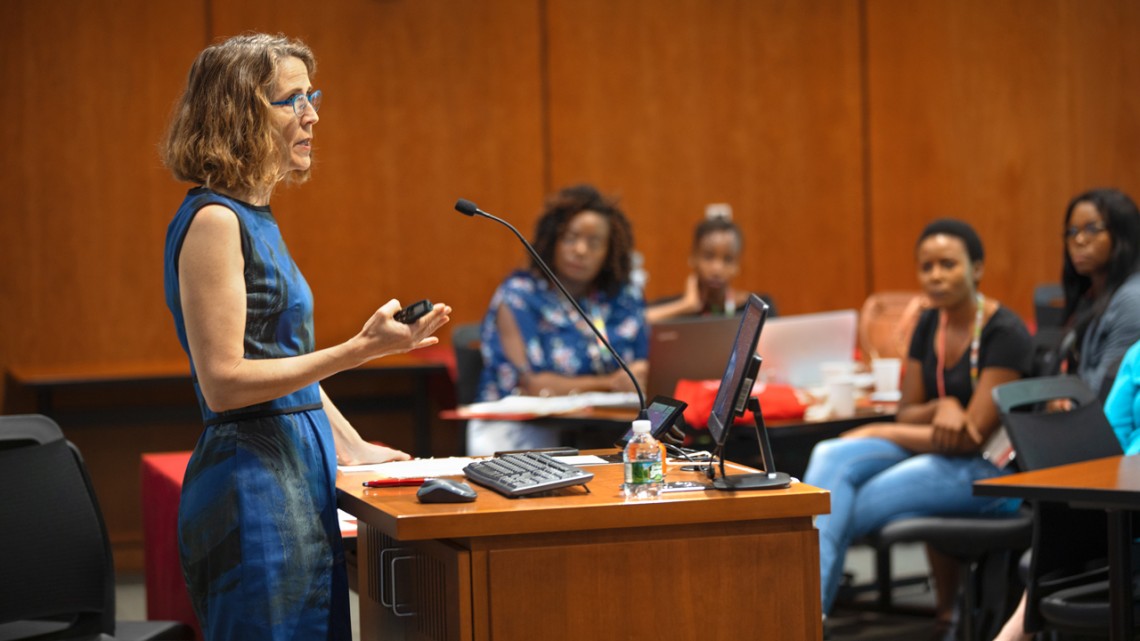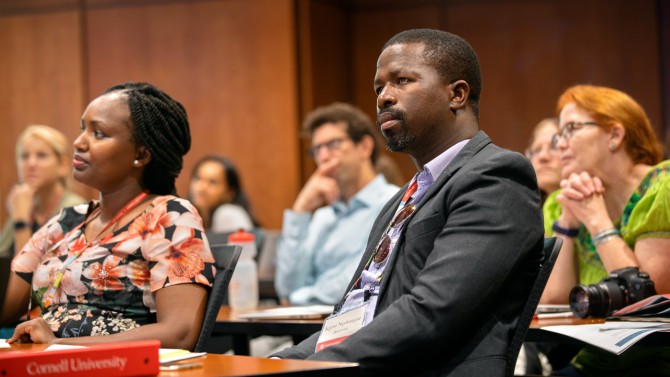
Sandra Babcock, clinical professor of law, kicks off the second annual Makwanyane Institute June 18 with a keynote address at Cornell Law School.
African lawyers gain expertise at death penalty institute
By Susan Kelley
Sub-Saharan Africa is at the vanguard of a movement to abolish the death penalty, and 14 African lawyers visiting Cornell Law School will help push that effort forward, according to an international death penalty expert.
Clinical Professor of Law Sandra Babcock kicked off the second annual Makwanyane Institute with a keynote address June 18 at Cornell Law School, welcoming death penalty attorneys from Botswana, Ghana, Malawi, Nigeria, Kenya, Sierra Leone, Tanzania and Uganda.
Organized by the Cornell Center on the Death Penalty Worldwide, the Makwanyane Institute is named for the South African Constitutional Court’s seminal decision abolishing the death penalty. The institute provides intensive training for attorneys representing those facing the death penalty in Africa. Makwanyane fellows develop skills such as client interviewing, mitigation investigation, litigation strategy and trial advocacy.
“When people think about the abolition of the death penalty, they think about Europe, first and foremost,” said Babcock, the center’s founder and faculty director. “I am absolutely convinced that Africa will be the next abolitionist continent – particularly when we look at sub-Saharan Africa.”
In her address, Babcock outlined how the center began, and its challenges and accomplishments.
Since 2007, she has been working with students and a coalition of Malawian organizations to obtain reduced sentences for people on death row and to assist prisoners in the criminal justice system who lack lawyers. They’ve obtained the release of 254 prisoners, more than half of whom were formerly sentenced to death.
Although more African countries abolish the death penalty every year, prisoners on death row are confined in extremely harsh conditions. Seeing a photo in 2005 of prisoners in Malawi sleeping pressed together, recalling images of slaves on a slave ship, prompted Babcock to act.
“When we learned more about the conditions in Malawi’s prisons, we realized there had to be something we could do as individuals but also as an academic institution,” she said.
In 2007, Malawi’s high court declared the country’s mandatory death penalty unconstitutional. At the time, 190 prisoners were on death row. She and Cornell students began a project in 2009 to get them resentenced. The goal was to find mitigating evidence – such as whether the prisoners had ever committed a crime before or were youthful offenders or mentally ill – to convince judges they should not have been sentenced to death to begin with.
Babcock’s team began modestly, by reading through case files. They also met with paralegals – key allies in a country with only 14 legal aid lawyers to serve a mostly indigent population of 18 million.
Many case files were missing. At the Malawi High Court in Lilongwe, the files were stored in unruly stacks in an empty toilet cubicle. The team spent eight months searching for the 190 files. They found 86.
So they investigated the cases with the missing files – an uncommon practice in Malawi – by traveling to villages, tracking down witnesses and interviewing clients’ family members to reconstruct the incidents that led to the convictions.
The team also trained mental health workers to assess clients for intellectual disabilities with a test that could be used with an illiterate population. They trained judges to understand the legal ramifications of mental illness and intellectual disability. When they discovered no lawyers had a copy of the penal code, they made copies on flash drives and distributed them freely.
“These basic things that we take for granted in many places are significant barriers to justice,” Babcock said.
Nine years later, 129 prisoners from this project have been released; many had spent 20 or more years in prison. The rest got a term of years, except one, who got a life sentence. “Not a single one was resentenced to death,” Babcock said. “It was a really extraordinary outcome, and the way we achieved [it] was through collaboration, community, a lot of hard work and creative ways to overcome the obstacles that we faced.”
This experience prompted Babcock to form the center in 2011, and the institute, which she called the center’s “crown jewel,” in 2016.
One of the institute’s goals is to nurture a sense of community among those doing the difficult work of helping people on death row – work that brings them together as a family, she told the Makwanyane fellows: “We are expanding our family to include all of you, and we hope you will nurture each other in that same way.”
Media Contact
Get Cornell news delivered right to your inbox.
Subscribe

